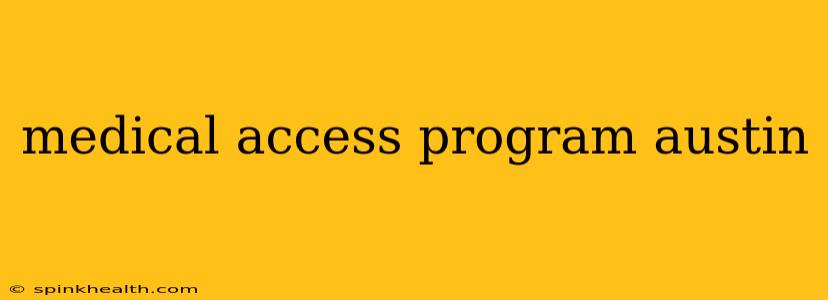Austin, a vibrant city brimming with opportunity, also faces challenges in ensuring equitable access to healthcare. For many residents, navigating the healthcare system can feel like traversing a complex maze. This guide aims to illuminate the pathways to medical access in Austin, addressing common questions and concerns. My hope is that this information empowers you to find the care you need.
What are some medical access programs in Austin?
Austin boasts a diverse range of programs designed to assist individuals and families in accessing necessary medical care. These programs vary significantly in their scope, eligibility criteria, and the types of services they provide. Some key players include:
-
Federally Qualified Health Centers (FQHCs): These community health centers offer comprehensive primary and preventative care, often on a sliding-fee scale based on income. They're a vital resource for low-income and uninsured individuals. Several FQHCs operate throughout Austin, providing a crucial safety net for the community.
-
Hospital-Based Charity Care Programs: Many Austin hospitals offer financial assistance programs to patients who are unable to afford their medical bills. These programs typically involve a thorough application process evaluating income and assets.
-
County-Level Programs: Travis County, where Austin is located, offers various health initiatives and programs focused on specific populations or health conditions. These programs may provide assistance with prescription medications, transportation to appointments, or other essential services.
-
Non-profit Organizations: A network of non-profit organizations in Austin works tirelessly to bridge the gap in healthcare access. These groups often focus on specific vulnerable populations, such as the homeless, uninsured, or those with chronic conditions. They may provide direct medical care, support services, or advocacy.
It's crucial to explore the specific programs offered by each organization to determine eligibility and available services.
How can I find a doctor who accepts my insurance in Austin?
Locating a doctor who accepts your specific insurance plan is often the first hurdle in accessing care. Most insurance providers offer online doctor search tools on their websites. Simply enter your location (Austin, TX) and your insurance information to generate a list of in-network providers. You can also utilize online directories such as Zocdoc or Healthgrades to filter results based on insurance acceptance.
What if I don't have health insurance?
Lack of health insurance is a significant barrier to accessing healthcare. However, several options exist for individuals without insurance:
-
Apply for Medicaid or CHIP: Medicaid provides healthcare coverage for low-income individuals and families, while CHIP (Children's Health Insurance Program) covers uninsured children. Applications are available through the state's Healthcare.gov portal.
-
Explore the Affordable Care Act (ACA) Marketplace: The ACA Marketplace allows individuals to purchase subsidized health insurance plans based on their income and eligibility.
What are the eligibility requirements for medical assistance programs in Austin?
Eligibility requirements vary greatly depending on the specific program. Income levels, household size, residency requirements, and citizenship status are common factors considered. It's essential to check the specific eligibility guidelines for each program you're interested in. Most programs have detailed information available online or through their contact centers.
Where can I find affordable healthcare in Austin?
Beyond the programs already mentioned, several strategies can help you find affordable healthcare:
-
Utilize urgent care clinics: For non-life-threatening conditions, urgent care clinics often offer lower costs than emergency rooms.
-
Negotiate payment plans: Many healthcare providers are willing to work with patients to create payment plans that fit their budgets.
-
Explore free or low-cost clinics: Several free and low-cost clinics in Austin offer basic medical services to underserved populations.
Accessing healthcare in Austin requires diligence and research, but the resources are available. By understanding the various programs and options, you can navigate the system effectively and secure the care you deserve. Remember, persistence is key, and don't hesitate to reach out to the organizations and programs listed for assistance. Your health is your most valuable asset, and obtaining the necessary care is crucial for well-being.

